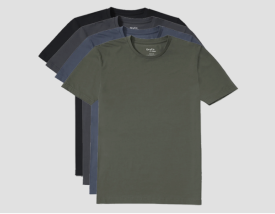So you’ve tried everything and nothing has worked. You’re starting to think, it may just be time to try out some natural and home remedies to control sweat. Although most of these remedies remain unproven, many people swear by their effectiveness. It may just be worth a shot, after all, sweating is natural, so why couldn’t the solution be natural as well?
We take a look at some of the home remedies and other natural approaches you can try.
Natural Therapies
Acupuncture
Too many people dismiss natural therapies and “far East” treatments outright. Not all alternative treatments work (looking at you magnetic therapy), but when we lump all these treatments in the same category, we miss out on the ones that do. Acupuncture is a good example of this.
Although acupuncture, a form of traditional Chinese medicine dates back at least as far as 100 BC, its effects hold up to modern medicine. It has proven efficacy in managing all sorts of pain, as well as relieving nausea and some respiratory disorders.
More recently, an article in the Journal of Chinese Medicine discussed the use of acupuncture for hyperhidrosis. This treatment was performed on an individual suffering from anxiety-caused hyperhidrosis. After the initial treatment, the patient experienced a 70% reduction in symptoms.
The results even demonstrate lasting effects. One month after completing the treatment, the acupuncture patient was still experiencing a 40% reduction in symptoms. As well, the treatment appears to directly reduce overall anxiety in the patient.
Acupuncture may not be the answer for everyone, but for the right individual, the potential is staggering.
Meditation
Relaxation has a definite impact on the severity of sweat. This is especially true where stress or anxiety causes or contributes to excessive sweating. By calming your mind and body you reduce the hormone suppressor response that triggers sweat.
Meditative techniques help to control breathing and stress levels. Not only does this reduce sweating in the moment, but it also increases your resilience afterward. As a result, you are better equipped to handle sweat-inducing stressors.
Although meditation is an extremely effective way to relax, there are other techniques available. Aromatherapy can be an effective way to help with passive relaxation. Try introducing calming smells, like chamomile and lavender, into your workspace.
Activities like yoga or spending time in nature can also have a similar benefit, relaxing the mind and body.
Vitamin Supplementation
When hormones are out of balance or our bodies aren’t functioning normally, a possible cause is vitamin deficiency. Vitamins are essential for all sorts of regulatory functions in the body, and a deficiency can do anything from making you tired, sweaty, or even sick.
Hormone Control
Vitamin supplementation with B vitamins and magnesium can help control hormones and stress levels. This can help manage sweat. If you’re sweating a lot, these vitamins are especially important. Sweat quickly depletes magnesium, causing further stress and increasing sweat production.
When the body is sweating through exertion, such as physical exercise, you may need to consume as much as twice the daily recommendation to maintain B vitamin levels.
Regulating Body Temperature
One of the best supplements to take for regulating body temperature is calcium. Vegan and lactose-intolerant people may have even greater needs for calcium, as milk products are among the richest sources. Green leafy vegetables are a good way to intake more calcium, and fit with just about any diet. Of course, you can always take supplements to make sure you hit your recommended daily dose.
Another benefit of calcium is that it makes it easier for your body to absorb magnesium. These two supplements compliment each other well and can be very effective in combination.
Vitamin D
If you sweat primarily from your head, you may have a Vitamin D deficiency. This is one of the most common vitamin deficiency. StatPearls estimates that 50% of the US population has this issue.
It’s especially common this time of year as we get much of our natural Vitamin D from the sun. With winter approaching and an ongoing lockdown, sun exposure and outdoor activity are at a low for most people.
The best way to verify whether or not you have a vitamin D deficiency is by taking a blood test.
Herbal Treatments
Sweat-Reducing
Herbal treatments often vary in effectiveness from one person to the next. In part, this is because of our different body makeups. As well, different herbs affect sweat production in different ways.
If one herb doesn’t work, try using something else. There are also different methods of application such as herbal teas, supplements, and topical creams. Here are a few reputable natural sweat remedies.
- Aloe Vera: The seemingly all-purpose herb. It’s used on sunburns and the plant is even grown to purify indoor air. Aloe vera can also help with sweat. It cools the skin and decreases body heat.
- Black Cohosh & Schisandra: These are two different plants that are commonly used by herbal enthusiasts to treat excessive sweating in menopause.
- Witch Hazel: This herb dries the skin and closes pores. Few open pores = less sweat.
Odor-Fighting
Are you seeking a home remedy for sweat that combats body odor? Try one (or a combination) of these herbal options.
-
Apple Cider Vinegar: Over the past couple of years, drinking apple cider vinegar has become the new "miracle" cure for digestion and weight loss. Consumption can also help balance pH levels, reducing sweat production.
But the uses aren't limited to ingestion. Try applying some of this vinegar to the skin on sweaty and smelly areas. It effectively kills odor-causing bacteria at the source. The acidity of lemons may have a similar effect, but is often harsh on sensitive skin. - Essential Oils: Essential oils are a good natural option for reducing odors. If synthetics in perfumes or colognes are too harsh of a smell, these are an excellent alternative. As well, these oils are well-suited for use in de-stressing techniques like aromatherapy.
- Sage: Sage is another antibacterial home remedy for sweaty odors. The evergreen shrub prevents the growth of odor-causing bacteria. The tannic acids in sage may also serve a secondary function. It is believed that tannic sage constricts sweat glands, which would further reduce sweat production.
- Tea: Chamomile and other herbal teas contain tannic acid, just as sage does. In addition to drinking tea, you can brew tea water and soak your sweaty hands of feet to reduce sweating—after it cools of course! You can also place a brewed tea bag on trouble areas.
Manage Excessive Sweating With Clothing
Another effective natural sweat remedy is as simple as changing the clothes on your back. If you struggle with sweaty armpits, back, or torso sweat, a sweatproof shirt could make all the difference.
Neat Apparel uses advanced moisture-wicking technology in our shirts. The design is breathable, to cool down trouble areas and minimize bacterial growth. When sweat does form, it discreetly wicks it away before visible stains or body odors can occur.
Shop the best sweat-wicking shirts today!







